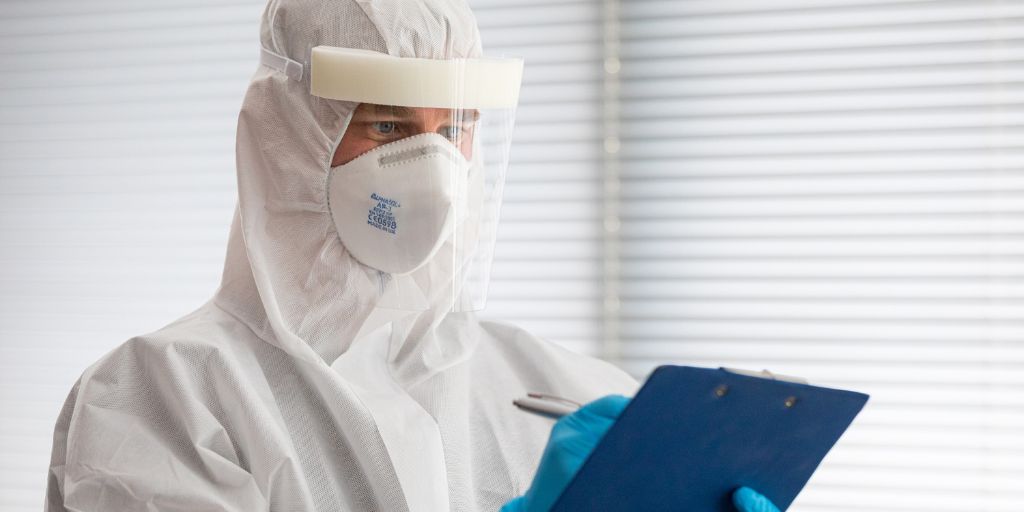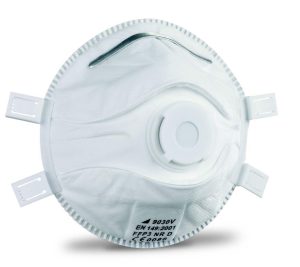
- Studies from York Economic Health Consortium (YHEC) and Vital Economics find higher grade protection would cut staff sick days and hospital acquired infections.
- The findings come as the NHS battles rising flu and COVID-19 rates heading into Winter 2022/23.
Switching from surgical masks to FFP3 respirators in UK hospitals could save the NHS £360m and boost efforts to tackle record waiting lists, a new economic impact study and analysis has found.
The study, carried out by the York Economic Health Consortium (YHEC) shows the universal use of properly fitted FFP3 masks could halve the number of hospital-acquired Covid infections and reduce NHS staff absences to levels similar to the general population.
Cutting infections on that scale would add an additional 1.8 million staff days per year according to further analysis conducted by Vital Economics, delivering a vital boost to hospitals’ capacity to treat patients. With a record 132,000 jobs unfilled across the health service, this increased staffing would allow beds to be cleared more quickly, boosting NHS efforts to sustain treatment levels.
More than 7,100,000 people are waiting for treatment according to latest figures from NHS England and new Health Secretary Steve Barclay has made cutting waiting lists a top priority. But leaders in the health service have said achieving the government’s targets on waiting times will be impossible without addressing staff vacancies.
The number of patients waiting longer than the 62-day target time for treatment topped 69,000 across England, Northern Ireland and Scotland this year – double the number in 2017-18. The NHS is also already experiencing the start of a winter Covid surge, with Covid hospitalisations rising 37% in just a week at the start of October, to 7,024[1] putting further pressure on already record waiting lists.
With Chancellor Jeremy Hunt’s Autumn Statement identifying tackling NHS inefficiencies as a major priority, the York study also found that the number of Covid-19 cases that would be prevented by use of FFP3 masks make them more cost effective than standard surgical masks, with the net benefits representing huge cost savings.
The benefits of upgrading masks are significant for staff and patients. FFP3 face masks fit better, are more suited to female face shapes and are the most effective at filtration, with a minimum filtration of 99% and a maximum leakage of 2% to the inside.

Hayden Holmes– Associate Director at YHEC commented: “There is existing evidence which demonstrates that FFP3 respirators are more effective than standard surgical masks at preventing respiratory disease infections like COVID-19. However, a key finding of this study is that there is the potential that FFP3 masks are also cost-effective when compared with surgical masks because of the number of hospital acquired infections they would prevent, for both patients and staff.”
Peter Dodd, Founder of Vital Economics, said: “Tackling staff shortages through recruitment and training alone is a costly and slow process. But by keeping existing staff healthy with comfortable, properly fitting FFP3 masks, which offer close to 100% protection against infection, we can help avoid a winter crisis in the NHS and tackle waiting lists. Ultimately FFP3 masks can save the health service hundreds of millions of pounds and reduce staff and patient suffering”
The YHEC study and Vital Economics analysis were commissioned by leading UK PPE manufacturer, Globus Group. Globus responded rapidly to the demand for PPE during the COVID-19 pandemic, opening three new manufacturing sites in the UK to ensure resilient and reliable supply. Globus delivered more than 252 million masks to NHS staff during the pandemic, and also provides extensive support to NHS Trusts with face fit testing staff with FFP3 respirator masks.
A Globus Group spokesperson said: “The NHS is facing unprecedented pressure as it tries to tackle record waiting lists. A universal shift to FFP3 masks across the NHS would be an effective and measure that could save more than £300m a year and make a real difference to hospitals and healthcare staff working tirelessly to beat the backlog.”
During the COVID-19 pandemic more than 20 healthcare organisations, including the British Medical Association, the Royal College of Nursing, and other professional organisations and unions, joined together in calling for greater provision of properly fitted FFP3 masks for frontline staff. The organisations emphasised that existing rules which do not require FFP3 masks leave workers vulnerable to airborne transmission of viruses and urged the government to ensure all staff caring for Covid patients were issued with FFP3s.
However, over two and a half years on from the start of the pandemic, NHS staff are still reporting[i] that they still are being provided with poorly fitting PPE. Alarmingly, female and ethnic minority staff are still more likely to report issues and are being put at disproportionate risk.












